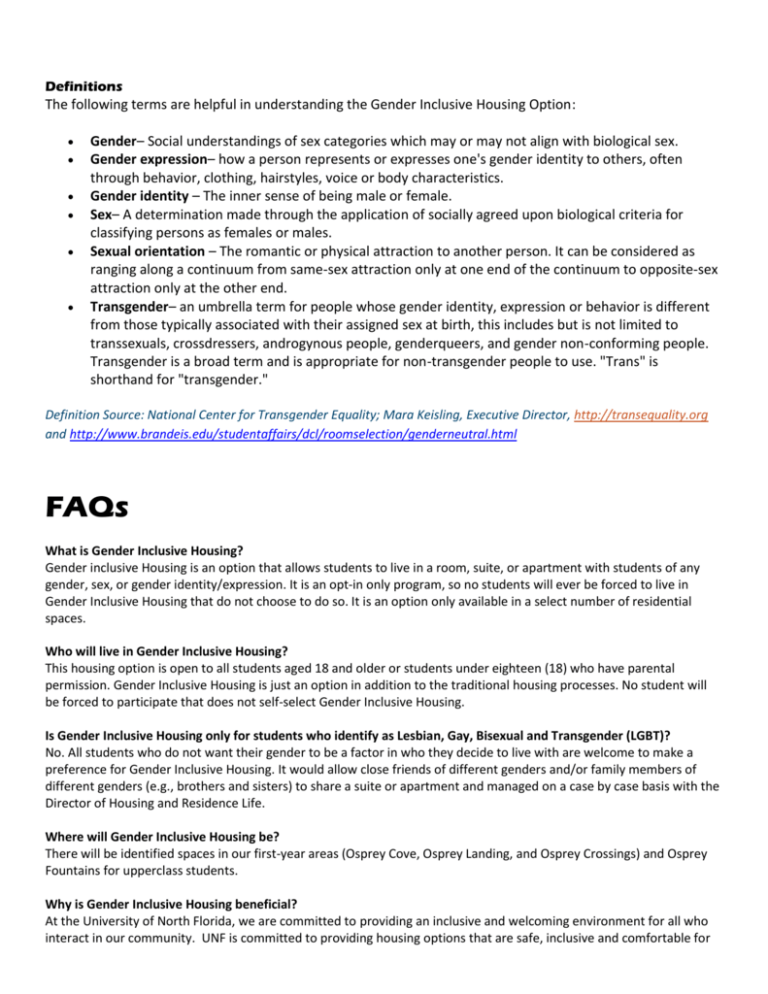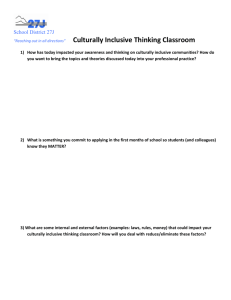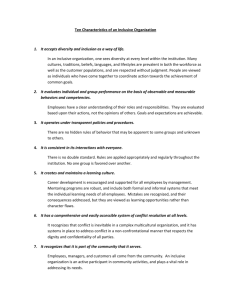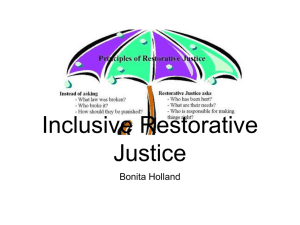
Definitions
The following terms are helpful in understanding the Gender Inclusive Housing Option:
Gender– Social understandings of sex categories which may or may not align with biological sex.
Gender expression– how a person represents or expresses one's gender identity to others, often
through behavior, clothing, hairstyles, voice or body characteristics.
Gender identity – The inner sense of being male or female.
Sex– A determination made through the application of socially agreed upon biological criteria for
classifying persons as females or males.
Sexual orientation – The romantic or physical attraction to another person. It can be considered as
ranging along a continuum from same-sex attraction only at one end of the continuum to opposite-sex
attraction only at the other end.
Transgender– an umbrella term for people whose gender identity, expression or behavior is different
from those typically associated with their assigned sex at birth, this includes but is not limited to
transsexuals, crossdressers, androgynous people, genderqueers, and gender non-conforming people.
Transgender is a broad term and is appropriate for non-transgender people to use. "Trans" is
shorthand for "transgender."
Definition Source: National Center for Transgender Equality; Mara Keisling, Executive Director, http://transequality.org
and http://www.brandeis.edu/studentaffairs/dcl/roomselection/genderneutral.html
FAQs
What is Gender Inclusive Housing?
Gender inclusive Housing is an option that allows students to live in a room, suite, or apartment with students of any
gender, sex, or gender identity/expression. It is an opt-in only program, so no students will ever be forced to live in
Gender Inclusive Housing that do not choose to do so. It is an option only available in a select number of residential
spaces.
Who will live in Gender Inclusive Housing?
This housing option is open to all students aged 18 and older or students under eighteen (18) who have parental
permission. Gender Inclusive Housing is just an option in addition to the traditional housing processes. No student will
be forced to participate that does not self-select Gender Inclusive Housing.
Is Gender Inclusive Housing only for students who identify as Lesbian, Gay, Bisexual and Transgender (LGBT)?
No. All students who do not want their gender to be a factor in who they decide to live with are welcome to make a
preference for Gender Inclusive Housing. It would allow close friends of different genders and/or family members of
different genders (e.g., brothers and sisters) to share a suite or apartment and managed on a case by case basis with the
Director of Housing and Residence Life.
Where will Gender Inclusive Housing be?
There will be identified spaces in our first-year areas (Osprey Cove, Osprey Landing, and Osprey Crossings) and Osprey
Fountains for upperclass students.
Why is Gender Inclusive Housing beneficial?
At the University of North Florida, we are committed to providing an inclusive and welcoming environment for all who
interact in our community. UNF is committed to providing housing options that are safe, inclusive and comfortable for
all students. We realize that not all students are comfortable living with students of the same sex. Gender Inclusive
Housing provides options for transgender students, students in the process of discovering their gender identity, gay or
bisexual students, students who feel uncomfortable with rooming with members of the same sex, intersex students who
do not wish to be identified by any sex, and students who feel that they would be more comfortable with a roommate of
a different gender.
Why is UNF starting Gender Inclusive Housing?
UNF has always worked with students who are uncomfortable living with roommates of the same sex as best as we
could. The addition of this option makes our communities more welcoming to all students and acknowledges the diverse
needs of our students. We know that the addition of Gender Inclusive Housing at UNF will help further develop our
communities as positive, respectful, and inclusive places for all residents.
Do other universities have Gender Non-Specific Housing?
Over 90 colleges and universities provide some type of Gender Inclusive Housing option. These institutions include
University of South Florida, Kennesaw State University, University of Maryland, University of Michigan, and Duke
University.
If I select this option, what does this mean?
UNF will seek to place students who select this option in a room or suite with others who have requested a room
assignment on this status. Every effort will be made to honor requests to be housed in this location as possible. If this is
not possible, legal sex will be used in determining housing placement.
If I don’t select this option, what does this mean?
It means that you will be involved in the general room selection process and not be selected for Gender Inclusive
Housing.
How do I choose to live in Gender Inclusive Housing?
Students will submit their Housing Contract and choose Gender Inclusive Housing as their preferred housing option.
Students will be placed in designates spaces as space is available. If a student would like to personally discuss their
individual request feel free to reach out to the Department of Housing and Residence Life.
How do I choose to live in Gender Inclusive Housing?
Students will submit their Housing Contract. Then they must submit a living-learning community application at
http://unf.edu/housing/llc and select “Gender Inclusive Housing” as their preferred housing option. If accepted into the
program by the advisory team, students will be placed in designates spaces as space is available.
How are roommates chosen?
Students wishing to live in inclusive housing would be required to mutually request all roommates and suitemates they
want to live with in the suite or apartment. The entire suite or apartment that want to live together sign an agreement
stating that they agree to the terms of living in this inclusive housing accommodation and understand what this options
means.
What about people who are uncomfortable with Gender Inclusive Housing?
No student will be required to live in a room, suite, or apartment that is identified as Gender Inclusive. Students must
specifically request to participate in that option.
What if a parent is upset about their student's participation in Gender Inclusive Housing?
Students will be encouraged to discuss their housing request with parents or guardians when they complete their
application for housing and make preferences. Students under 18 will require parental/guardian permission to
participate in Gender Inclusive Housing. If a parent is unhappy with their student’s participation, housing officials will be
available to address their concerns or questions.
Will there be an additional cost to the university to implement this program?
No. Existing facilities will be used.
Will there be an additional cost to participate in Gender Inclusive Housing?
No. Standard housing rates per community and room type apply.
Will there be additional expectations for living in Gender Inclusive Housing?
At this time, there are no additional academic requirements for participating in Gender Inclusive Housing. Students
involved in Gender Inclusive Housing are held to the same expectations of all residential students as outlined in
university policies, your housing contract, and the Resident Handbook. Residents, like those of any other UNF residence
hall, must adhere to common standards of civility and respect regarding diverse gender identities/expressions and
sexual orientations. The entire suite or apartment that want to live together sign an agreement stating that they agree
to the terms of living in this inclusive housing accommodation and understand what this options means.
If I choose to participate in the gender inclusive housing option, how will this weigh on my other housing options?
UNF will make every effort to accommodate both your wish to be assigned housing based on gender inclusive need, as
well as your other preferences (i.e., low-cost housing, specific hall choice, etc.). While all students are encouraged to
provide housing preferences, UNF cannot guarantee to any student a specific hall, room or roommate. All assignments
are based upon space availability.
Will choosing the gender inclusive option help me to get better housing?
The choice to be housed based on your gender inclusive is an additional option offered to students. Choosing this
option does not garner special consideration for specific rooms or locations.
What if a heterosexual couple requests to participate?
Students of any sexual orientation can participate. Research from colleges and universities around the country shows
that very few heterosexual couples have requested to participate in gender inclusive housing options.
What about roommate conflicts?
The same expectations of students and procedures that apply for gender specific housing will apply to Gender Inclusive
Housing. The procedures may vary given the specifics of the conflict, but in general will be as follows: (a) attempt at
mediation/resolution with the involvement of the Resident Assistant, (b) mediation/resolution with the involvement of a
Residence Life Coordinator or other housing professional staff member, (c) requesting a room change. The person who
requests a room change is not guaranteed another space in Gender Inclusive Housing depending on availability. Also, if
the person requesting to move out cancels their housing contract completely (i.e., moves off campus) they have to pay
the same fee or prorated amount as would any other person who cancelled their housing contract.
Who can I contact to find out more about gender identity and UNF support programs?
Please visit the UNF LGBT Resource Center in the Student Union, Building 58 East, room 1111, call 904-620-4720 or
unflgbt@unf.edu .
Are there other websites that I can check out to learn more about gender identity and transgender issues?
Yes! Below are some informative websites that you may find useful. Also, once you arrive on campus, the Lesbian, Gay,
Bisexual, and Transgender (LGBT) Resource Center offers many educational programs that you can check out.
Gender Education and Advocacy: www.gender.org
International Foundation of Gender Education: www.ifge.org







